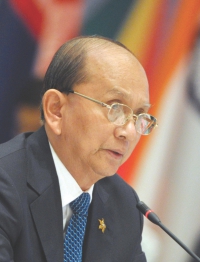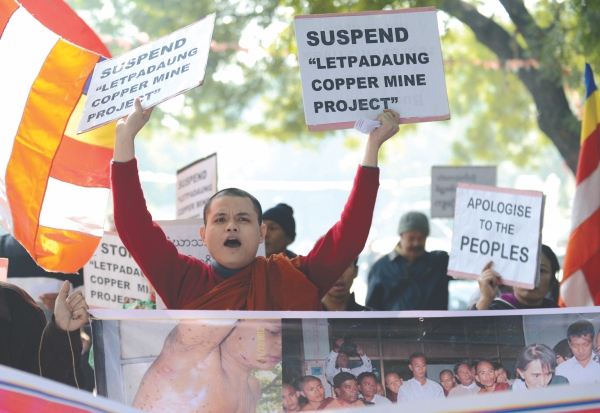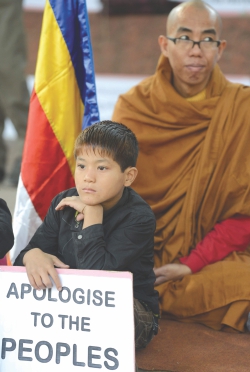| Home - Back Issues - The Team - Contact Us |
 |
| Volume 11 |Issue 51| December 28, 2012 | |
|
|
Neighbours Myanmar's Teething NIRMAL GHOSH
The dust from the violent incident at the Letpadaung copper mine in Myanmar is yet to settle. But the contours of a complicated reality with political implications are revealing themselves. Before dawn on November 29, riot police moved in to disperse protesters at the mine - jointly run by a Chinese weapons manufacturer and a business arm of Myanmar's powerful Tatmadaw (army). Protesters had been sitting there for over a week, bringing mine operation to a halt. They had grounds senior figures in the Myanmar government acknowledged. Their concerns were environmental and cultural. The Chinese company had wanted to shift a historic monastery. In addition, 26 villages were to be uprooted and relocated to make room for an expansion of the mine. The riot police used water cannons and gas canisters. Phosphorus was present in some of the canisters. Mixed with water, it produced a flammable compound. Fires caught and plastic awnings went up in flames. In the chaos, many were injured and some monks were burned. There was a domestic and international outcry, with talk of the Myanmar security authorities going back to the bad old days of the heavy-handed military regime. The reform process itself was under threat, some analysts and organisations said. Faced with the outcry, the government apologised. It also set up an inquiry committee headed by National League for Democracy (NLD) leader Aung San Suu Kyi. The incident was a confluence of several factors, said analysts and senior Myanmar government sources. One was that the Chinese investor had been insensitive over the monastery. Other Chinese companies at two mines nearby had not had any problems. Another was land. Under the old regime, land concessions were given without much thought about the reality on the ground. A company would often take more land than necessary. "Sometimes they would just draw a square on a grid," said Minister in the President's Office U Soe Thane. "We are now not going to give a company more land than what is really needed, only the bare minimum, and we will consider the ground situation." One of the greatest challenges to the reformists around President Thein Sein is nebulous: the great expectations of the Myanmar public within and pressure groups on the outside, with regard to democracy. Under the military regime, a strike by mine labourers and a protest joined by monks would not have been tolerated. It is the new democratic space that has opened up under the reforms that made the prolonged strike possible.
The policemen who took part in the raid, working under commanders drawn from the military, were not trained in dispersing unarmed civilian protesters. "They have zero idea," one senior government figure admitted. The choice of a pre-dawn raid - the reason being that sleepy protesters would be easier to disperse - worked against the police when the flash fires occurred. There was enormous panic. Dozens were injured, some very badly. Throughout the buildup to the raid and its aftermath, even though the government had given a deadline to the protesters to clear the site, not enough information was provided. "Crisis management in this country is outdated," commented Dr Min Zaw Oo, director of ceasefire implementation at the Myanmar Peace Centre. "In the past, it was 'avoid the issue and keep your mouth shut'. But that only means rumours prevail. In this country, rumours are powerful tools." Many in government believe that while local grievances were real, political actors had stepped into the mix. One senior figure called them "third parties, agitators". Senior figures in the government and close to it insist that those involved included radical groups such as "hardliners" still in exile and "communist-minded people" - some of whom are remnants of the old Communist Party of Burma - who believe the transition is a superficial one, with the military still in charge, and that the only way to have a true transition is to have a people's uprising. "These groups have an issue with Thein Sein and want to provoke China," said one senior government figure. The democratic space has opened up opportunities to "mobilise a people power movement" and discredit the President, said one Yangon-based analyst, asking not to be named.
The opposition NLD had a stake in the electoral process and the 88 Generation Students movement was now seen as moderate, he said. But the more radical groups "will use every opportunity to incite public sentiment and uprisings". Some pro-reform analysts and diplomats also blame, in private, shrill advocacy groups who swiftly pounce on any bad news from Myanmar to question the genuineness of reform - playing into the hands of those who want to undermine the reformers. France-based political analyst Mael Raynaud, who had worked in Myanmar for years, wrote in an e-mail that while it was critical for advocacy groups to monitor progress and point out areas where not enough had been done, there should be clarity that no transition can be perfect. "Pushing is good, pushing too hard can be a mistake," he said. In his interview two weeks ago with The Straits Times, President Thein Sein emphasised two priorities: political stability and the "legitimacy of the state". Political instability may erode the credibility of the President and his reformist allies, leading to questions over the "legitimacy of the state". The army could lose faith in the reform process or the security situation and seize power - as has happened in countries with any history of army rule - like Thailand and Pakistan. "It is critical for us to evade political shocks before 2015" - the year of the next general election - said the Yangon analyst. Myanmar's reform process is ambitious, robust and wide but not deep enough yet. It could be shaken if events conspire to discredit reformers. Yet problems like Letpadaung are inevitably a product of a much more plural landscape in a very early transitional phase. "It is not easy to inherit problems from the old government," said a Yangon-based consultant who also asked not to be named, citing organisational rules. "And in some rural areas, democracy is seen as a licence to do anything they want, and that is a real risk. There could be more Letpadaungs."
Copyright
(R) thedailystar.net 2012 |


